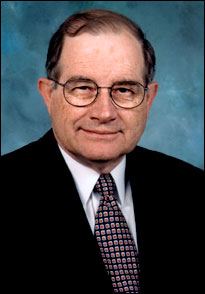Former Presidential Science Advisor Neal Lane to Speak at Brookhaven Lab, September 11 and 12
August 4, 2006
UPTON, NY - Neal Lane, the Science Advisor to President Clinton from 1998 to 2001, will give a series of two lectures at the U.S. Department of Energy's Brookhaven National Laboratory. On Monday, September 11, he will present a talk titled "Confessions of a President's Science Advisor," and on Tuesday, September 12, he will discuss "The End of an Era - Science in a 'Flat World.'" Both lectures will start at 4 p.m. Sponsored by Brookhaven Science Associates through the George B. Pegram Lectureship Series, in which distinguished scholars examine topics of both scientific and general interest, the lectures are open to the public and will be held in the Laboratory's Berkner Hall. Visitors to the Laboratory age 16 and over must bring a photo ID.
In his first lecture on September 11, Lane will briefly review the history of the job of Science Advisor to the President and give some examples of issues he had to deal with when he was in that position, including climate change, stem cell research, the human genome, nanotechnology and research funding. He will also give his opinions about the present and future state of science in the U.S.
In his September 12 lecture, Lane will discuss the changes that have taken place in the world since World War II that have made it "flatter," referring to Thomas L. Friedman's book, The World is Flat (Farrar, Straus and Giroux, 2005). Friedman's main premise is that inexpensive telecommunications is bringing about unhampered international competition, the demise of economic stability, and a trend toward outsourcing services, such as computer programming, engineering and science research.
Lane will also discuss a "flatter" world in terms of leveling the playing field for science vs. ideology, religion and superstition. In particular, he asserts that American attitudes about science and technology, as well as the political winds that affect science, have changed. He will also pose some questions and offer some opinions about the future of American science.
Born in Oklahoma City, Lane earned his B.S., M.S. and Ph.D. degrees in physics from the University of Oklahoma. He joined Rice University as an Assistant Professor in the Department of Physics in 1966, eventually becoming Professor of Physics and Space Physics and Astronomy. While on leave from Rice from 1979 to 1980, he worked at the National Science Foundation as Director of the Division of Physics. He again left Rice in 1984 to serve as Chancellor of the University of Colorado in Colorado Springs, a position he held until 1986. From 1986 to 1993, Lane was Provost at Rice University.
Lane served as Director of the National Science Foundation and member (ex officio) of the National Science Board, from 1993 to 1998, and Assistant to the President for Science and Technology and Director of the White House Office of Science and Technology Policy, from August 1998 to January 2001. He returned to Rice in 2001.
Currently, Lane is the Malcolm Gillis University Professor at Rice University. He also holds appointments in the Department of Physics and Astronomy and as a Senior Fellow at Rice's James A. Baker III Institute for Public Policy, where he is engaged in matters of science and technology policy.
Lane's many writings and presentations include topics in theoretical atomic and molecular physics and science and technology policy. Lane has received numerous awards, including the American Association for the Advancement of Science (AAAS) Philip Hauge Abelsom Award, the AAAS William D. Carey Award, the American Society of Mechanical Engineers President's Award, the American Chemical Society Public Service Award, the American Astronomical Society/American Mathematical Society/American Physical Society Public Service Award, and many honorary degrees. He is a fellow of the American Academy of Arts and Sciences, the American Physical Society and the AAAS.
For more information on the talks, call (631) 344-2345. The Laboratory is located on William Floyd Parkway (County Road 46), one and a half miles north of Exit 68 of the Long Island Expressway.
2006-10517 | INT/EXT | Newsroom










